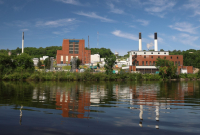Support strong Canadian climate journalism for 2025
As the federal Liberals fend off attacks from the right-wing over the carbon price, a new flank is opening to their left, with the NDP calling on the government to order an inquiry into oil and gas company price gouging.
In a letter sent to Innovation, Science and Industry Minister François-Philippe Champagne dated March 27, NDP House leader Peter Julian and NDP innovation, science and economic development critic Brian Masse wrote Canadians are “rightly frustrated” by the price of gas they pay at the pumps at the same time fossil fuel companies are posting record profits.
“As you are surely aware, oil and gas companies in Canada made a combined $70 billion in profits in 2022 as oil prices soared,” the letter reads. “That’s a 60 per cent increase in profits for oil and gas extraction and a doubling of profits for the refining sector over and above the already massive $42 billion in profits the oil and gas industry made in 2021.
“But as world oil prices have come down, oil and gas profit margins have remained high, and Canadians still continue to pay more,” the letter adds. “Clearly, price gouging by big oil companies is a major factor in the high prices at the pumps.”
The letter comes as a fierce debate over inflation and the carbon price dominates Parliament Hill. Conservative Leader Pierre Poilievre is aiming to topple Prime Minister Justin Trudeau’s government over the policy by casting it as the chief driver of the cost of living crisis.
However, experts have said Poilievre is cherry-picking facts in an attempt to mislead the public. Despite his claims that the carbon price pushes the cost of fuel, home heating and goods up, the Bank of Canada estimates the carbon price is responsible for only 0.1 per cent of annual inflation.
Trudeau has defended the carbon price, telling premiers he is committed to the policy as a sound environmental and economic policy. But to date, the defence has mostly centred on refuting Conservative claims rather than explaining what else his government will do to tackle kitchen-table affordability concerns.
By shining a spotlight on corporate price gouging, the NDP is offering another explanation for high prices. Whether it will help or hurt the Liberals with voters remains unclear.
Julian and Masse point to $18.5 billion worth of subsidies provided to oil and gas companies last year by the federal government, at a time of sky-high profits, to argue the NDP is the only party willing to tackle “corporate greed” head-on.
“We know that Pierre Poilievre won’t ever go after greedy oil and gas CEOs because he is in their pocket,” the MPs wrote.
“We are calling on you, Minister, to act to stop price gouging,” the MPs added. “Recent changes to the Competition Act allow you to direct the Competition Bureau to conduct an inquiry into the state of competition in any market.”
Champagne’s press secretary Audrey Champoux told Canada’s National Observer that the minister can direct a market study in consultation with the Competition Bureau commissioner, but cannot order an investigation.
“With that said, he has written to the commissioner on this matter in the past, asking that the bureau keep an eye out for unfair practices or collusion in this sector,” Champoux said.
Two years ago in the immediate fallout of Russia’s invasion of Ukraine, Champagne reportedly asked the Competition Bureau to put teams in place to ensure there is no collusion on the price of gasoline.
The Competition Bureau is clear that it is common for gas stations to charge identical prices and to see sudden price jumps ahead of long weekends, but that as long as the companies have not agreed to price-fix, they aren’t breaking the law.
The regulator has laid charges at least 24 times since 2008 relating to price-fixing at gas stations, with fines reaching as high as $1.85 million.






Comments
Collusion is what corporate oil and gas do best. Their lobbying, lying, gouging and polluting make them the worst corporate citizens in the world. 260 billion plus of unfunded environmental liabilities in Alberta alone, just in abandoned and orphaned infrastructure clean up costs - then there is the incalculable damage from climate change and pollution clean up. Time to but a hard stop on this nonsense.
Immature MAGA wannabe F350 truck owners who are insecure about their manhood, take note. Canning the carbon tax will not make rolling coal in the faces of environmentalists and EV owners any cheaper.
An independent inquiry in oil company price gouging was done in BC a few yeaes back by then premier John Horgan. This was after years of corporate and conservative media blaming taxes for steep fuel price spikes.
Petroleum companies were roundly blamed for the highly inflationary spikes, according to the actual evidence. The companies had no explanation for their price spike of 13% at the time. The companies temporarily stopped their blaming of taxes for their own monopolistic behaviour of taking captive consumers to the cleaners on price increases. Prices came down slightly until the stirm blew over. Up they went again right after.
EVs can't come fast enough to counter the mass dependency on oil, and wipe out Big Oil's smug behaviour.